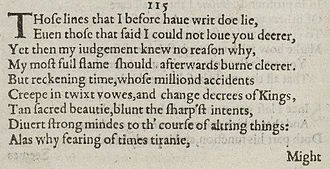Poem by William Shakespeare
| «» Sonnet 115 | |||||||
|---|---|---|---|---|---|---|---|
 The first nine lines of Sonnet 115 in the 1609 Quarto The first nine lines of Sonnet 115 in the 1609 Quarto | |||||||
| |||||||
Sonnet 115 is one of 154 sonnets written by the English playwright and poet William Shakespeare. It is a member of the Fair Youth sequence, in which the poet expresses his love towards a young man.
Synopsis
The poet's earlier verses were a lie because it said he could not love the youth more. At the time he didn't understand that his love could be more intense in future, assuming that time would blunt it. Fearing this, he said that he loved the youth most powerfully then. Love is a baby, so might he not ascribe full size to one that's still growing?
Structure
Sonnet 115 is an English or Shakespearean sonnet. The English sonnet has three quatrains, followed by a final rhyming couplet. It follows the typical rhyme scheme of the form ABAB CDCD EFEF GG and is composed in iambic pentameter, a type of poetic metre based on five pairs of metrically weak/strong syllabic positions. The 1st line exemplifies a regular iambic pentameter:
× / × / × / × / × / Those lines that I before have writ do lie, (115.1)
This sonnet contains examples of all three metrical variations typically found in literary iambic pentameter of the period. Lines 2 and 4 feature a final extrametrical syllable or feminine ending:
× / × / × / × / × / (×) My most full flame should afterwards burn clearer. (115.4)
- / = ictus, a metrically strong syllabic position. × = nonictus. (×) = extrametrical syllable.
The 12th line exhibits an initial reversal, which can also be found in line 13 (and potentially in lines 6, 7, and 10):
/ × × / × / × / × / Crowning the present, doubting of the rest? (115.12)
Finally, the 9th line exhibits the rightward movement of the third ictus (resulting in a four-position figure, × × / /, sometimes referred to as a minor ionic):
× / × / × × / / × / Alas! why, fearing of Time's tyranny, (115.9)
The meter demands a few variant pronunciations: line 2's "even" functions as one syllable, line 5's "reckoning" and line 8's "altering" as two, and line 8's "to the" is contracted to "to th'".
References
- Pooler, C Knox, ed. (1918). The Works of Shakespeare: Sonnets. The Arden Shakespeare . London: Methuen & Company. OCLC 4770201.
- Morton Luce (1913). Shakespeare, the Man and His Work. Seven Essays. Adamant Media Corporation. p. 58. ISBN 1402139926.
- Kiernan, Victor Gordon; Kiernan, Victor (1993). Shakespeare: Poet and Citizen. p. 244. ISBN 0860913929.
- David Schalkwyk (2002). Speech and Performance in Shakespeare's Sonnets and Plays. Cambridge University Press. pp. 163–164. ISBN 0521811155.
- James Blair Leishman (2005). Themes and Variations in Shakespeare's Sonnets. Routledge. p. 103. ISBN 0415352959.
- Booth 2000, pp. 99, 379.
Further reading
- First edition and facsimile
- Shakespeare, William (1609). Shake-speares Sonnets: Never Before Imprinted. London: Thomas Thorpe.
- Lee, Sidney, ed. (1905). Shakespeares Sonnets: Being a reproduction in facsimile of the first edition. Oxford: Clarendon Press. OCLC 458829162.
- Variorum editions
- Alden, Raymond Macdonald, ed. (1916). The Sonnets of Shakespeare. Boston: Houghton Mifflin Harcourt. OCLC 234756.
- Rollins, Hyder Edward, ed. (1944). A New Variorum Edition of Shakespeare: The Sonnets . Philadelphia: J. B. Lippincott & Co. OCLC 6028485. — Volume I and Volume II at the Internet Archive
- Modern critical editions
- Atkins, Carl D., ed. (2007). Shakespeare's Sonnets: With Three Hundred Years of Commentary. Madison: Fairleigh Dickinson University Press. ISBN 978-0-8386-4163-7. OCLC 86090499.
- Booth, Stephen, ed. (2000) . Shakespeare's Sonnets (Rev. ed.). New Haven: Yale Nota Bene. ISBN 0-300-01959-9. OCLC 2968040.
- Burrow, Colin, ed. (2002). The Complete Sonnets and Poems. The Oxford Shakespeare. Oxford: Oxford University Press. ISBN 978-0192819338. OCLC 48532938.
- Duncan-Jones, Katherine, ed. (2010) . Shakespeare's Sonnets. Arden Shakespeare, third series (Rev. ed.). London: Bloomsbury. ISBN 978-1-4080-1797-5. OCLC 755065951. — 1st edition at the Internet Archive
- Evans, G. Blakemore, ed. (1996). The Sonnets. The New Cambridge Shakespeare. Cambridge: Cambridge University Press. ISBN 978-0521294034. OCLC 32272082.
- Kerrigan, John, ed. (1995) . The Sonnets ; and, A Lover's Complaint. New Penguin Shakespeare (Rev. ed.). Penguin Books. ISBN 0-14-070732-8. OCLC 15018446.
- Mowat, Barbara A.; Werstine, Paul, eds. (2006). Shakespeare's Sonnets & Poems. Folger Shakespeare Library. New York: Washington Square Press. ISBN 978-0743273282. OCLC 64594469.
- Orgel, Stephen, ed. (2001). The Sonnets. The Pelican Shakespeare (Rev. ed.). New York: Penguin Books. ISBN 978-0140714531. OCLC 46683809.
- Vendler, Helen, ed. (1997). The Art of Shakespeare's Sonnets. Cambridge, Massachusetts: The Belknap Press of Harvard University Press. ISBN 0-674-63712-7. OCLC 36806589.
| Shakespeare's sonnets | ||||||||
|---|---|---|---|---|---|---|---|---|
| "Fair Youth" sonnets |
|  | ||||||
| "Dark Lady" sonnets |
| |||||||
